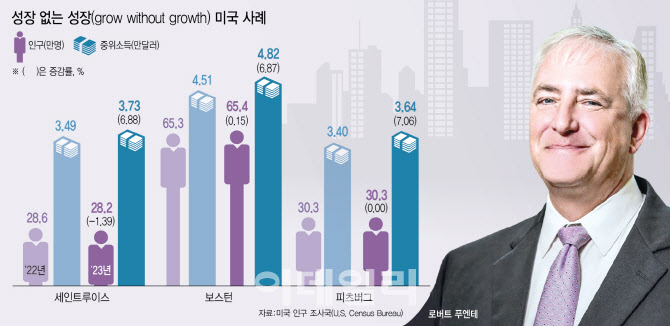Robert Puente, Deputy Director of Brookings Metro, recently told Edaily that the coming demographic environment will unfold differently from the past. He stressed that regions must adapt with tailored, localized efforts.
He will speak at the Edaily-PERI Special Symposium on June 19 at the Shilla Hotel in Seoul, presenting on regional population strategies and fiscal outlooks. Founded in 1996, Brookings Metro is part of one of America’s top 3 think tanks, conducting policy research on urban and regional issues.

Robert Puente, Deputy Director of Brookings Metro (Graphic by Reporter Mina Lee)
Puentes first explained the changing demographic structure in the U.S. “The number of Hispanic, Asian, and multiracial children is rapidly increasing, while the number of white children is on the decline,” he said. “With the baby boom generation entering retirement, the elderly, who are mostly white, will increase much faster than the youth population. Between 2016 and 2030, the elderly population will grow by 50%, but the child population will rise by only 3.5% and the working-age population by just 4%.”
“This means that, in addition to investing in the next generation of diverse youth, we must also pay attention to the growing elderly population,” he continued. “National leaders concerned with future labor supply, consumption patterns, and the provision of social and medical services must recognize this new reality.”
He also noted that the pace and nature of demographic change varies across the U.S., requiring region-, city-, and suburb-specific strategies. “Declining cities need a different approach from growing ones,” he said.
“For example, Buffalo, New York, and Youngstown, Ohio, have long experienced population outflows and little new minority immigration, resulting in both cities and suburbs facing aging populations and demographic stagnation. These areas need to focus on attracting jobs, retaining young people, and expanding infrastructure and social support for the elderly,” Puentes explained.
In contrast, “Houston, Texas, and Las Vegas, Nevada, are rapidly growing with an influx of immigrants and domestic migrants, leading to a surge in both young and elderly populations. These regions must invest heavily in education and social support for young families and children of diverse backgrounds, while also preparing for the rising needs of a rapidly aging population,” he advised.
So what policies are realistic for Korea’s demographic crisis? He said, “The core goal of policy should be improving residents’ economic well-being.” He suggested Korea to consider whether “growth without growth”, raising per capita income without population growth, is possible.
Unlike traditional GDP-focused growth, this approach seeks economic advancement through higher per capita income or productivity even as the total population declines. Puentes pointed to U.S. metro areas like St. Louis, Missouri; Boston, Massachusetts; and Pittsburgh, Pennsylvania as examples.
According to the U.S. Census Bureau, St. Louis saw its population fall by 1.39% from 286,000 to 282,000 between 2022 and 2023, but median household income rose 6.88% from $34,900 to $37,300. This is attributed to the “STL 2030” plan, which aims for inclusive economic growth by enabling all residents to realize their potential and share in economic success.
Boston and Pittsburgh show similar trends. Boston’s population grew by only 0.15% between 2022 and 2023, but median household income rose by 6.87%, thanks to a highly educated workforce and a high-wage, knowledge-based economy. Pittsburgh’s population remained nearly flat, but median household income increased by about 7% over the same period, reflecting a shift from manufacturing to high-value industries and the creation of high-paying jobs.
Puentes also noted concerns about the low fiscal autonomy of Korean local governments. Drawing on the U.S. experience, he emphasized the importance of local discretion. “For America to achieve greater prosperity, metropolitan areas must be equipped to respond dynamically to changing economic, social, and environmental realities,” he said. “This requires a new cooperative framework between federal, state, and metropolitan governments that provides metros with the necessary support, capabilities, and autonomy.”
◇ About Robert Puentes, Deputy Director of Brookings Metro:
After serving as Director of Infrastructure Programs at the Intelligent Transportation Society of America, Puentes worked as Senior Research Manager and Director of the Metropolitan Infrastructure Initiative at the Brookings Institution. He has also served as President and CEO of the Eno Center for Transportation and as a planning commissioner for Falls Church, Virginia.
